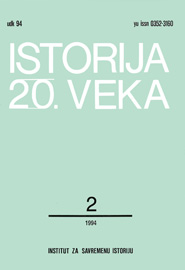SLOVENCI I JUGOSLOVENSKA DRŽAVA IZMEĐU DVE MAJSKE DEKLARACIJE (1917-1989)
YUGOSLAVIA AND THE SLOVENIANS BETWEEN THE TWO MAY DECLARATIONS 1917-1989
Author(s): Momčilo ZečevićSubject(s): Political history, Recent History (1900 till today), Nationalism Studies, History of Communism, Politics and Identity, Identity of Collectives
Published by: Institut za savremenu istoriju, Beograd
Keywords: Yugoslavia; Slovenians; May declarations; 1917; 1989; Yugoslav state; national integration;
Summary/Abstract: The dissolution of Yugoslavia after 1991 led, among other things, to an awakened interest of the various Yugoslav peoples in national history but an interest dominated by conservative tendencies, demands for revision of the past and a »new course« in the study of history.The competing nationalistic ideologies and the existing conflicts on the territory of the former Yugoslavia have influenced the tone of a large part of current history publications as well as the scientific research of history. However, protests against this type of engaged historiography are becoming louder, pointing out the harm which can come to civilization from »stealing« or deliberately »forgetting« the past. Demands are made that the settling of old national disputes should be based on scientific methods. One such attempt at scientific objectiveness was made by eminent Slovenian historians in 1993, gathered around the following theme question: »Was joining the Yugoslav state a necessity or mistake for the Slovenians?« Their answers to this question cover the vital points of Slovenian history where it is related to Yugoslavia, beginning with the Slovenians’ attitude towards the Yugoslav idea, the unification in 1918, the system of government, as well as their struggle for an autonomous, federal and finally independent position in Yugoslavia in the years of the country's crisis towards the end of the 80s and the beginning of the 90s. There is, however, a noticeable absence of topics related to economy and foreign policy, without which no comprehensive and objective conclusion can be reached. The majority of the historians were of the opinion that being part of the Yugoslav state was the Slovenians’ own choice. The time spent withing Yugoslavia was marked not only by the Slovenians’ struggle for national and social recognition which eventually resulted in the historic progress of the Slovenian people, but was also fraught with the discord and the recurrent crises of the entire country. One of the unanimous conclusions, markedly emphasized, was that without its Yugoslav period, the Slovenian people would probably never have achieved such national integration, demographic, cultural and economic development and, finally, an internationally recognized national state of their own. Despite pointed references to current politics, especially to the role of Serbia and the Serbian people in the Yugoslav state,the greater part of the Slovenian historians answered the theme questioning accordance with the scientific requirements of historiography, striving to give pragmatic and rational support to the new position of the nation and protecting it at the same time from mythological exaggerations.
Journal: Istorija 20. veka
- Issue Year: 1994
- Issue No: 2
- Page Range: 31-47
- Page Count: 17
- Language: Serbian

